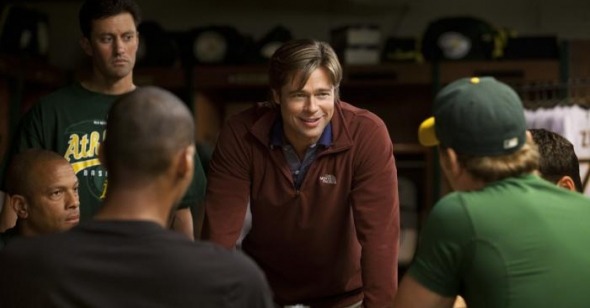Monday Hangover:
Moneyball
By Adam Nayman and Eric Hynes
“It’s hard not to be romantic about baseball.” That’s the main refrain of Moneyball, and don’t director Bennett Miller and writers Steven Zaillian and Aaron Sorkin know it. This adaptation of Michael Lewis’s 2003 book about baseball’s statistical revolution makes a point of eschewing sports-flick clichés, but really, it's only skillfully disguising them. We still get a troupe of loveable losers beating the odds, clubhouse hijinks, a big midseason turnaround (complete with Major League–style victory montage), and a climactic game filled with close-ups and slow-motion heroics. The fact that it’s all nicely scare-quoted doesn’t mean that the filmmakers aren’t leaning on this stuff for all it’s worth.
The skill is there, though, largely consolidated in Brad Pitt’s very poised and ultimately irresistible performance as Oakland A’s general manager Billy Beane, a failed college baseball star whose front-office career is framed as an attempt at poeticality repudiating past failures. The flashbacks to Beane’s salad days aren’t particularly well done—and Reed Thompson, who plays the man as young slugger, doesn’t match up well with Pitt—but the dramatic architecture is sound: deflated by his on-diamond failures, Beane seeks a way of doing business that will simultaneously bring him glory while taking revenge on a system that overrated his own abilities. He finds it in sabermetrics—a wholly empiricist mode of analysis that looks past home runs and RBIs to determine which players get on base the most.
The scenes of Beane’s initial conversion to the church of advanced statistics, after being convinced by awkward number cruncher Peter Brand (Jonah Hill)—a stand-in for real-life A’s assistant-GM Paul DePodesta—are the most entertaining in the film, partly because they show us something most sports films don’t (the pitiless calculations of team-building) and partly because the actors are having fun. I can’t take Hill in his noxious jester mode, but he’s alert and funnily fervent here. I’d also like to single out Chris Pratt, so good on Parks and Recreation, as catcher-turned-reluctant first-baseman Scott Hatteberg. In a small role, he etches a memorable and fairly novel character type: the spooked jock. —AN
Having closely followed the baseball season chronicled in Moneyball, I got a kick out of seeing demiheroes-of-very-recent-yesteryear like Hatteberg, Jeremy Giambi, and David Justice (Stephen Bishop approximates the former slugger’s sweet swing quite nicely) depicted in a Hollywood prestige picture. It’s even more up my alley than the moveable feast of famous authors in Woody Allen’s Midnight in Paris. (Hey look, it’s “Everyday Eddie” Guardado! Is that a SAG actor playing journeyman Jason Grimsley?) Yet though I liked Pratt just fine, Adam, the characterization was indicative of what troubled me most about the film: it’s all shorthand, all primary coloring. The script calls for a spooked jock, to borrow your wonderful phrase, so as Hatteberg, a 32-year-old veteran at the time, Pratt has to project the self-confidence of a bowl of Jell-O. Manager Art Howe (Philip Seymour Hoffman) can’t just be an old-school skipper who clashes with Billy Beane’s statistics-based philosophy—he has to be a stubborn dumbfuck that we mock. The script calls for one nuanced character (Pitt’s) and one appealing sidekick with a mini-arc (Hill’s)—the rest are around to simply make these dudes look good. This is some classic Syd Field streamlining, and smacks of insecurity with heady source material (it’s about math!).
As far as big studio dramas are concerned, Moneyball functions well—it’s far too long but goes down easy, is well acted and stylishly shot. But it’s also a missed opportunity. Sorkin’s involvement only calls to mind how successfully a seemingly uncinematic story (the origins of Facebook) was adapted into a work of both art and entertainment last year, and suggests that Awakenings screenwriter Steven Zaillian is the real architect here. It’s not about pleasing baseball fans like me (though, c’mon: the film goes so far to avoid complicating its Bad News Bears–esque narrative that in recounting the 2002 Oakland Athletics season it doesn’t even mention MVP Miguel Tejada or Cy Young Awarded Barry Zito?). It’s about trusting that the audience can keep up when you’ve made the effort to bring them along. The film’s best scene is its most Sorkinian—a rapid-fire clubhouse-cleaning in which Pitt and Hill make a bunch of phone calls, read statistics from a laptop, and make trades to improve the team. Good dialogue, a strong volley between engaged performers, and cross-cutting: this, as much as anything else—and certainly more than slow-mo pantomiming on an underlit baseball diamond—is cinema. Here the film rises from Jerry Maguire to David Mamet territory, and suggests how thrilling (rather than merely solid) Moneyball could have been if it weren’t so watered, slowed, and dumbed down. —EH
